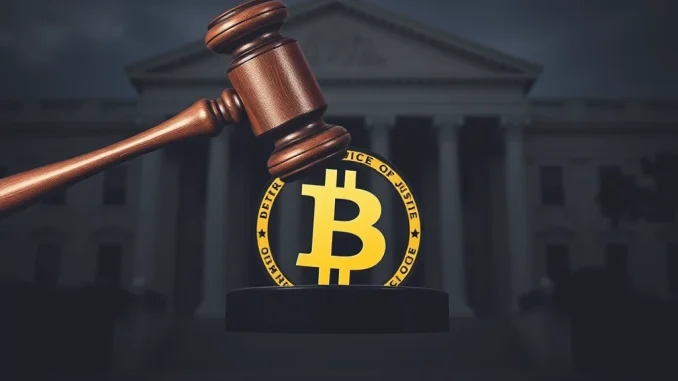
In a move that has sent ripples through the cryptocurrency world, the U.S. Department of Justice (DOJ) has reportedly decided to cease investigations into crypto exchanges, mixers, and offline wallets concerning user actions. This unexpected shift in policy means ongoing cases will be dropped, and the DOJ’s dedicated crypto enforcement team is being disbanded. While the DOJ may still target individual bad actors within the crypto space, this sweeping change has ignited a firestorm of debate, particularly around the potential for increased fraud and reduced user protection. Is this a bold step towards fostering crypto innovation, or a risky gamble that could embolden illicit activities? Let’s dive deep into what this groundbreaking decision means for the future of crypto.
What’s Behind the DOJ Crypto Investigations Halt?
The sudden halt to DOJ crypto investigations into crypto exchanges and wallets has left many industry experts and enthusiasts scratching their heads. While official reasons remain somewhat vague, several theories are circulating. Some speculate this could be a strategic realignment of resources, perhaps shifting focus towards more pressing national security threats or different forms of financial crime. Others suggest it might be a tacit acknowledgment of the challenges and complexities in regulating the rapidly evolving crypto landscape. Here are a few potential factors contributing to this dramatic policy shift:
- Resource Reallocation: Investigating crypto-related crimes, especially those involving decentralized exchanges and privacy wallets, is incredibly resource-intensive. It requires specialized skills, advanced technology, and significant manpower. The DOJ might be redirecting these resources to areas deemed higher priority.
- Regulatory Uncertainty: The regulatory framework surrounding cryptocurrencies in the U.S. is still evolving. Navigating this uncertainty and applying existing laws to novel crypto technologies presents significant legal and practical hurdles. Halting broad investigations could be a temporary measure while clearer regulatory guidelines are established.
- Focus on Individual Bad Actors: Instead of casting a wide net over entire platforms and technologies, the DOJ might be adopting a more targeted approach, focusing on prosecuting individuals directly involved in criminal activities rather than penalizing entire crypto ecosystems for the actions of some users.
- Economic and Innovation Concerns: Aggressive enforcement against crypto exchanges and wallets could stifle innovation and drive legitimate crypto businesses offshore. A lighter touch approach might be seen as more conducive to fostering a healthy and competitive crypto industry within the U.S.
Impact on Crypto Exchanges and Wallets
For crypto exchanges and wallet providers, this news likely comes as a significant relief. The threat of DOJ investigations has been a persistent cloud hanging over the industry, creating uncertainty and compliance burdens. With the investigations paused, these platforms may experience:
- Reduced Regulatory Pressure: The immediate pressure from federal investigations will lessen, potentially freeing up resources previously allocated to legal defense and compliance.
- Increased Operational Flexibility: Exchanges and wallets might feel more comfortable exploring new features and services without the immediate fear of triggering a DOJ probe related to user actions.
- Potential for Growth: Reduced regulatory headwinds could attract more users and investment into the crypto exchange and wallet sector.
However, this perceived relaxation in enforcement also raises concerns. Will this embolden less reputable exchanges or create a haven for illicit activities? The industry will need to proactively address these concerns to maintain user trust and prevent a regulatory backlash in the future.
The User Perspective: Freedom or Increased Risk?
The implications for individual crypto users are complex and multifaceted. On one hand, the halt in DOJ crypto investigations might be seen as a win for privacy and financial freedom. Users of crypto wallets, particularly offline or hardware wallets, often prioritize control and anonymity. This policy shift could be interpreted as a validation of these principles.
On the other hand, the potential for increased fraud and illicit activities is a serious concern. Without the deterrent of DOJ oversight, the crypto space might become more attractive to bad actors. This could manifest in several ways:
- Rise in Crypto Scams: A less regulated environment could lead to a surge in scams, phishing attacks, and rug pulls, targeting unsuspecting crypto users.
- Money Laundering Concerns: Mixers and privacy-focused wallets, while offering legitimate privacy benefits, can also be exploited for money laundering. Reduced enforcement might exacerbate this issue.
- Increased Volatility: If illicit activities become more prevalent, it could destabilize the crypto market and increase volatility, impacting all users.
Users need to be more vigilant than ever, practicing robust security measures and staying informed about potential risks. Due diligence when choosing exchanges and wallets will be crucial in this evolving landscape.
What Happens to Crypto Enforcement Now?
While the DOJ is stepping back from broad investigations into platforms, it’s crucial to understand that crypto enforcement is not entirely ceasing. The announcement emphasizes a shift in focus, not a complete abandonment of regulatory oversight. Here’s what we can expect:
- Targeted Investigations: The DOJ will likely concentrate its efforts on individual actors involved in significant crypto-related crimes like large-scale fraud, ransomware attacks, and terrorist financing.
- Collaboration with Other Agencies: Other agencies like the SEC, CFTC, and FinCEN will continue their regulatory and enforcement activities within the crypto space. The DOJ might collaborate with these agencies on specific cases.
- International Cooperation: Crypto crime is often transnational. The DOJ will likely continue to work with international law enforcement agencies to combat illicit crypto activities that cross borders.
- Evolving Enforcement Strategies: The DOJ might be developing new, more sophisticated strategies for crypto enforcement that are more targeted and effective than broad investigations into platforms.
US Department of Justice and the Future of Crypto Regulation
The decision by the US Department of Justice to halt broad crypto investigations marks a significant turning point in the regulatory approach to digital assets. It signals a potential shift from a heavy-handed, platform-centric approach to a more nuanced, individual-focused strategy. This move could be interpreted as:
- A Maturation of Crypto Regulation: As the crypto industry matures, regulatory strategies are also evolving, moving away from blunt instruments towards more precise tools.
- Balancing Innovation and Security: The DOJ might be attempting to strike a better balance between fostering innovation in the crypto space and mitigating risks to consumers and the financial system.
- A Call for Industry Responsibility: This shift places greater responsibility on crypto exchanges, wallet providers, and the industry as a whole to self-regulate and implement robust anti-fraud and anti-money laundering measures.
Navigating the New Crypto Landscape
The DOJ’s decision has created a new landscape for the cryptocurrency world. While the immediate future remains uncertain, here are some actionable insights for different stakeholders:
For Crypto Exchanges and Wallet Providers:
- Strengthen Compliance: Don’t mistake reduced DOJ scrutiny for a free pass. Proactively enhance your KYC/AML procedures and security measures.
- Engage with Regulators: Maintain open communication with regulatory bodies and participate in industry discussions to shape future regulations.
- Focus on User Education: Educate your users about security best practices and the risks associated with crypto to build trust and protect your platform’s reputation.
For Crypto Users:
- Enhance Security Practices: Use strong passwords, enable two-factor authentication, and be wary of phishing attempts. Consider using hardware wallets for added security.
- Stay Informed: Keep up-to-date with crypto news and regulatory developments. Understand the risks and rewards associated with different crypto assets and platforms.
- Exercise Caution: Be skeptical of promises that seem too good to be true. Do your own research before investing in any crypto project or platform.
Conclusion: A Bold Move with Uncertain Outcomes
The DOJ’s decision to halt investigations into crypto exchanges and wallets is undoubtedly a shocking development. It’s a bold move that could usher in a new era of crypto regulation, one that potentially prioritizes innovation and individual responsibility over broad enforcement actions. However, it also carries inherent risks. The potential for increased fraud and illicit activities cannot be ignored. The success of this new approach hinges on the crypto industry’s willingness to step up and self-regulate, and on users’ commitment to practicing vigilance and responsible crypto engagement. Only time will tell if this shift proves to be a liberating step forward or a miscalculated gamble in the ever-evolving world of cryptocurrency.



